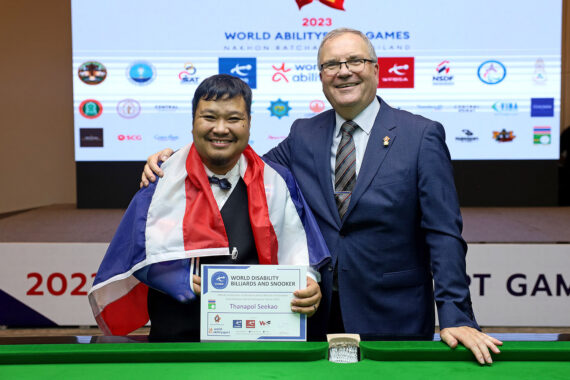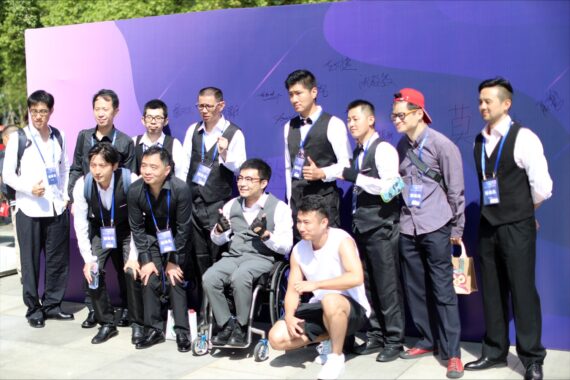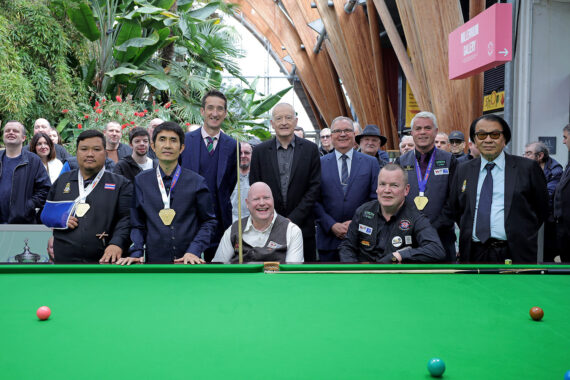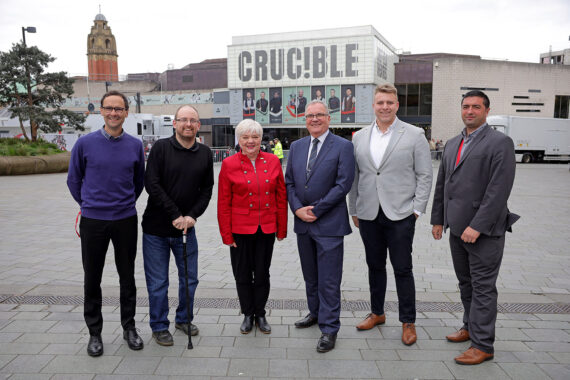WDBS & Me: Chris Hornby
This summer marks five years since the formation of World Disability Billiards and Snooker (WDBS) and today we continue our look back on the journey so far by hearing from Chris Hornby, one of the people to have been involved from the very beginning.
Having joined the World Professional Billiards and Snooker Association (WPBSA) at the start of 2015 as its Sports Development Manager, Hornby was tasked with helping to re-energise snooker at amateur level – including disability snooker.
A Blank Canvas
Prior to the birth of WDBS, annual tournaments had been held for over 20 years by Disability Sports England, most recently in 2013 at the South West Snooker Academy. But with no event staged in 2014 and few other opportunities for people with disabilities to engage with snooker at any level, Hornby recalls how the initial WDBS team came together during the following year.
“I had been introduced at the Masters within my first weeks in the job to Tim Squires,” said Hornby. “He was a coach with experience of coaching people with disabilities and who would join the initial board. A few months later at the World Championship there was a further meeting with people who had previously been involved with disability snooker events, including Clive Brown who was clearly going to become a key member of the board with his tournament director experience.
“Together with my colleague Nigel Mawer QPM, Vice Chairman of the WPBSA, we both committed to be hands-on involved at this point, together with Tim and Clive. The board was joined by Bob Hill, at the time a qualified WPBSA coach with experience of coaching people with learning disabilities, as well as former Paralympian Jonathan Adams, who competed in the shot put event at the 2012 Games.”
With the team assembled, attention turned to laying down the foundations upon what Hornby describes as a ‘blank canvas’ with no established pre-existing administration in existence.
“It was unclear to us all without solid data if there would be enough demand for events,” recalls Hornby. “We decided to take a punt on putting on a trial event, with the emphasis on offering an open day purely for free coaching and practice for anyone with a disability.
“Jess Cook from Activity Alliance (then the English Federation for Disability Sport) was extremely helpful in the early stages of formation guiding us in the right direction and signposting key contacts. Through Activity Alliance we utilised an existing classification system to shape the first event.
“It was an exciting time to be able to grow something from scratch and five years on I am proud to have been involved in something so unique.”
To Gloucester
The trial event would ultimately become the 2015 Open Disability Snooker Championship, held at the South West Snooker Academy in November. For the team it was a voyage into the unknown in all aspects, with uncertainty as to the number of participants expected and from which classification groups they would represent.
“I remember sitting in my office thinking that we hadn’t got enough players to be able to separate the classification groups,” said Hornby. “Luckily, as would become a trend to this day, many players left it until late in the day and we had enough more players entered and we had the bare bones of an event.”
There was the added pressure of the planned filming of a piece by IMG to be broadcast during the subsequent UK Championship on the BBC, with no stone left unturned in the professionalisation of the event with bespoke t-shirts, medals, certificates and referees recruited to ensure its smooth running.
Ultimately however, the event would prove to be a real success and as Hornby recalls, came with a family feel that continues to this day.
“The open day went well and included a large group from Bristol brought by Bob Hill,” continued Hornby. “Their infectious smiles and the energy that they brought to the snooker room stood out. We had brought the World Snooker Championship trophy from the World Snooker office and the players loved getting their pictures with it.
“One thing we focused on – and still do to this day – is ensuring that each player is properly welcomed to the event as it may feel very daunting coming to your first event. Ruth Mawer (Chairman Nigel Mawer’s wife) was key in those early days and ensured that everyone was welcomed and comfortable within the venue. This is the basis to the family feel of the WDBS, getting to know individuals as people as well as players.
“The tournament itself was a success and IMG did a fantastic job of putting the piece together for television. What I hadn’t anticipated were the characters that we would meet, each with their own story and challenges, but fantastic attitudes to life and competitive edge. In particularly, Raja Subramanian who came all the way from India made the event international and gave it greater creditability. If the television piece hadn’t been so good, I don’t think that WDBS would have grown so much in those early days.”
While Subramanian had travelled across the world to compete however, his opponent in the Group 4-5 final was Tony Pockett, a player for whom his journey was far shorter, but just as monumental for him personally. Having heard about the event on local radio, Pockett entered the event at the last minute and would earn an emotional trip to York for the UK Championship with his performance.
“When he was presented with his medal at the Barbican Centre Tony started crying and was overwhelmed by it all,” recalls Hornby. “He came to York with his wife and he wrote to us afterwards thanking us and saying how much of a mental boost it had given him. He hadn’t played snooker for 10 years and it had been the first time he had been out of Gloucester for 30 years!
“This is what sport and snooker especially can deliver to people. Snooker is overlooked by many as a sport that can offer benefits to its participants but what WDBS has tried to offer its players over the last five years will hopefully at some point change a lot of people’s perceptions going forward.
Global Game
From the outset one of the long-term goals of WDBS has been to see snooker restored to its rightful place at the Paralympic Games, having been contested most recently at the Seoul games in 1988.
A key part of making this goal a reality is the further internationalisation of the WDBS Tour, which began with the introduction to the calendar of the Belgian Open in 2018 and having welcomed an increased number of players from outside of the UK, including Poland, India, Germany and Hong Kong.
Of course, the role played by China in the development of the professional sport over the past 15 years has been unprecedented and in 2018 Hornby, together with Nigel Mawer, visited the Chinese Paralympic Training Facility in Beijing, to meet with representatives of the China Administration of Sports for Persons with Disabilities (CASPD).
“Snooker in China in massive and they have fully embraced the sport,” continued Hornby. “The government and sporting authorities treat it with so much more respect than they do in the UK, investing and putting it into schools and higher education.
“We managed to get a meeting with (CASPD) and subsequently agreed a memorandum of understanding (MOU) to work together on future projects for players with disabilities. To see the size of the facilities was fascinating and the WPBSA committed to supply some tables for training. We worked closely with the Chinese Billiards and Snooker Association (CBSA) to ensure they were included in the agreement and could provide coaches if required.”
Each year CASPD organises a week of events to celebrate disability sport and offers a range of sporting activities. Part of this was to be a snooker open day at the CBSA Academy in Beijing, which took place while Chris and Nigel were present.
“It was arranged that CASPD would bus in two groups of around 20 people to the academy and we supplied five CBSA coaches who had been through the WPBSA coaching programme to deliver basic sessions,” added Hornby. “The majority of participants were new to playing the sport but quickly embraced it. CCTV 5, one of the main sport channels came and did some interviews and it was surreal to see our activities featured online the next day.
“The most memorable moment for me during the open day was a gentleman with one arm. He stood off from the tables and every time I tried to engage him to join the others on the table he declined pointing at his prosthetic. I remembered that I had brought a cueing aid device that one of our wheelchair players Mark Parsons had made for WDBS. I got the coach to show him how to use it and showed him pictures of players from the UK who play with one arm like Kal Mattu and John Teasdale and he eventually engaged.
“By the end we couldn’t get him off the table. We told him to keep the cueing aid, he was so happy and said he had enjoyed playing with the others. We told him when we return, we want him to be a top player and I hope that we will see him again in the future.”
To this day Chris remains a key part of the WDBS team and often a first point of contact for new players who contact us about competing in upcoming events, advising on classification groups and encouraging them to come along to weekends and take part.
Check back here at wdbs.info for more content this summer as we look back on our first five years…













